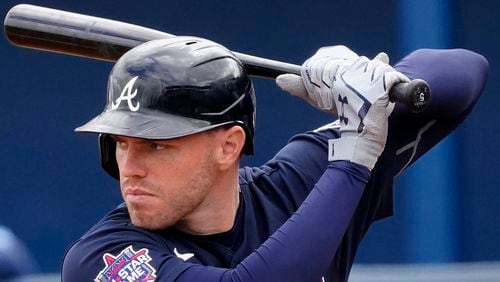Everything about the Braves felt good as they opened the 2021 MLB season. It wasn’t just the intoxicating elixir of opening day, which is so strong that it overwhelms any skepticism and causes a buzz. It’s that there was really no reason for the Braves to be skeptical, so everyone could just get drunk on fun.
The Braves have a roster good enough to win the franchise’s first World Series since 1995. All key players were healthy except right-hander Mike Soroka, and he’ll be back soon. Truist Park will be up to half full of fans by the end of the month. A cold day in Philadelphia and a loss to the Phillies didn’t do anything to ruin the mood.
Yet there was a negative thought in the back of the collective brains of Braves backers. It was a minor annoyance, a fleeting thought. But it was there. and had to be dealt with, if only briefly, before returning to the good times.
The season began without a contract extension for first baseman Freddie Freeman. He’ll become a free agent if no deal is reached by the end of the season. That means Braves must contemplate something they’ve never had to consider since Freeman became a lineup regular in 2010 and an All-Star in 2013.
Could Freeman leave the Braves?
That wouldn’t happen until after the season, if it happens at all, so any anxiety among the team’s customers should be at a low level. It probably will increase a bit each day a deal isn’t announced. It likely would become a mild panic if the season ends with no contract extension for Freeman. Then he (technically) wouldn’t be a Braves player for the first time in his career.
That dynamic probably explains why Braves general manager Alex Anthopoulos offered some reassuring words on opening day. Before the game, Freeman said there’s nothing to talk about regarding his contract. During the game, the GM didn’t provide any details on negotiations in an interview with Bally Sports South’s Chip Caray, but he had an optimistic message.
“I guess the best thing I can say to that end is we want him here, he wants to be here and, at the end of the day, it’s on us to make sure we can get it done,” Anthopoulos said.
He added: “When you have a star player, an elite player that cares so much about the organization, the community, from a GM standpoint there are deals you worry about and deals you don’t worry about. He’s one of those guys you don’t worry about. He checks all the boxes.”
That means the Braves should value Freeman more than any other team. I imagine Freeman’s price going up each time Anthopoulos effusively praises Freeman as the ultimate Brave. The GM’s words will be highlighted if there is ever an inkling that Freeman might go somewhere else.
On the other hand, Freeman long has asserted the good feelings are mutual. If that continues to be the case, the assumption is that he wants to play here more than anywhere else. Freeman has been with the Braves from the beginning. He’s become such a fixture here that it’s easy to forget he’s from California and difficult to imagine him playing anywhere else.
It’s never been necessary to think about it until now. The Braves signed Freeman to an eight-year, $135 million extension in 2014. That was three years before Freeman would be eligible for free agency. He was 24 years old and had just finished fifth in voting for National League MVP. The contract was the richest in franchise history at the time. It ended up being a great bargain for the Braves.
Freeman’s 30.8 bWAR in the seven seasons since signing the extension is eighth best in the majors during that time. Freeman has been the team’s best player as the Braves bottomed out and then came back around to being good. Now he’s the reigning NL MVP as the Braves chase a World Series ring.
Freeman ‘s extension was one of former GM Frank Wren’s best moves. At the time, it was groundbreaking to give a player with so little experience so much money. Now it’s viewed as a shrewd move to lock up star young players at below-market prices. Anthopoulos did that when he signed Ronald Acuna and Ozzie Albies to relatively cheap deals and expanded his team-building possibilities.
The circumstances are different with Freeman. He’s outperformed his current contract, but he’s 31 years old. The Braves want to pay him for future production. Anthopoulos must calculate what that’s worth to the Braves while also considering the contexts of Freeman’s age and popularity.
The team’s trajectory is factor. Acuna soon will be the team’s best player if he isn’t already. But Freeman just won the NL MVP award at 30 years old. If he were to leave after this season, the Braves would risk overpaying some other free agent to replace his production in the short term.
Anthopoulos would be blamed if Freeman leaves under his watch, even if weren’t necessarily the GM’s fault. That’s how it goes with his job. He’s got to make calculated decisions that sometimes are unpopular. Freeman likely has plenty of good years left. Anthopoulos’ task is determining how many, and how good.
There are two well-known statistical methods that estimate declining performance of baseball players with age. One was developed by Tom Tango and Mitchel Lichtman, the other by J.C. Bradbury. Both approaches agree that baseball players peak in performance sometime before they turn 30 (they differ on when) and then gradually decline after.
Jonathan Judge of Baseball Prospectus revisited those models last year. Judge calculated an aging curve that places players’ peak performance a little later than those formulas. He determined that players decline in performance until “falling below league average by 32 and declining more rapidly thereafter.”
Keep in mind, though, that those methods attempt to measure the aging curve for average players. Freeman is not an average player. His peak is very high, so he should remain a good ballplayer even as he declines. According to age-based similarity scores developed by statistical pioneer Bill James, Freeman’s production over his first 10 full seasons is most like Eddie Murray.
Murray is in the Hall of Fame. That doesn’t mean Freeman will end up in the Hall. It does mean that, statistically, he’s on that path. Five or six more very good seasons probably would earn him consideration. Two or three solid ones after that would really boost his case.
Both team and player want Freeman to remain with the Braves for those years. There’s no question that’s what Braves fan want. Those are personal feelings. Now it’s come down to the business of baseball.
As Anthopoulos said, it’s on the Braves to get it done.
About the Author







